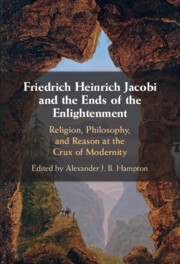 Friedrich Heinrich Jacobi and the Ends of the Enlightenment
Friedrich Heinrich Jacobi and the Ends of the Enlightenment Book contents
- Friedrich Heinrich Jacobi and the Ends of the Enlightenment
- Reviews
- Friedrich Heinrich Jacobi and the Ends of the Enlightenment
- Copyright page
- Dedication
- Epigraph
- Contents
- Contributors
- Foreword
- Acknowledgments
- Abbreviations
- Introduction
- Part I The Critique of Reason: Debates on Rationalism, Empiricism, and Skepticism
- Part II Faith and Revelation: Debates on Theism, Atheism, and Nihilism
- 5 Jacobi’s Argument and Dilemma
- 6 The Jacobi–Schelling Debate
- 7 Jacobi’s Response to Religious Nihilism
- 8 Jacobi and the German Protestant Tradition
- Part III Jacobi and the Revival of Socraticism: The Muenster Circle and Existentialism
- Part IV Jacobi’s Impact on Idealism and Romanticism
- Jacobi Sources
- Index
- References
5 - Jacobi’s Argument and Dilemma
Theism and Christianity
from Part II - Faith and Revelation: Debates on Theism, Atheism, and Nihilism
Published online by Cambridge University Press: 09 February 2023
- Friedrich Heinrich Jacobi and the Ends of the Enlightenment
- Reviews
- Friedrich Heinrich Jacobi and the Ends of the Enlightenment
- Copyright page
- Dedication
- Epigraph
- Contents
- Contributors
- Foreword
- Acknowledgments
- Abbreviations
- Introduction
- Part I The Critique of Reason: Debates on Rationalism, Empiricism, and Skepticism
- Part II Faith and Revelation: Debates on Theism, Atheism, and Nihilism
- 5 Jacobi’s Argument and Dilemma
- 6 The Jacobi–Schelling Debate
- 7 Jacobi’s Response to Religious Nihilism
- 8 Jacobi and the German Protestant Tradition
- Part III Jacobi and the Revival of Socraticism: The Muenster Circle and Existentialism
- Part IV Jacobi’s Impact on Idealism and Romanticism
- Jacobi Sources
- Index
- References
Summary
Jacobi’s claims concerning the relationship between philosophy and religion are complex and often expressed in varied ways. This chapter sorts out the arguments Jacobi brings in support of his conception of epistemic realism, the opening of reason to suprasensible reality, as well as the relationship between Jacobi’s philosophy and Christianity.
Keywords
- Type
- Chapter
- Information
- Friedrich Heinrich Jacobi and the Ends of the EnlightenmentReligion, Philosophy, and Reason at the Crux of Modernity, pp. 87 - 103Publisher: Cambridge University PressPrint publication year: 2023
